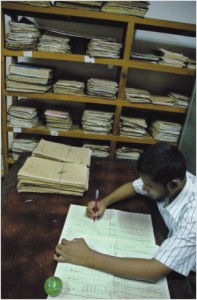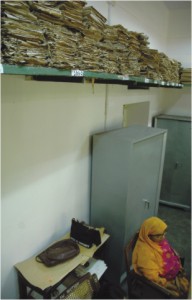| |
Masters and Servants

We need to dismantle our colonialised administration to move forward, argues M. Maniruzzaman
We, the citizens of Bangladesh, have already lost two golden opportunities to build our future -- once after independence and then after the victory in the movement for democracy. On both occasions, the whole nation was united with common dreams and aspirations. But the nasty politics of the past 36 years failed to fulfill the aspirations of the common citizens to initiate long-ranging reforms of the colonialised administration.
Delete the word administration
I would love to see the unnecessary and colonially-rooted words 'administration' and 'administrator' (proshason and proshasok) deleted from the dictionary. The departure of the British and the Pakistanis could not remove the colonial mentality of these so-called administrators, who are in fact public servants and in no way rulers. I get upset when I see big signs along the streets and on public buildings saying "district administration" or "upazila administration." Neither the deputy commissioners nor the upazila nirbahi officers are administrators. They are public servants and are paid by the taxpayers. Today, not only are the DCs and UNOs administrators, practically all government officials have also become administrators.
Readers might be aware of words like krisi proshason, motshya proshason, police proshason and so on in the secretariat and in the government departments. This has proliferated to the semi-government and autonomous organisations. Today, the top positions of scientific and research organisations, like those in agricultural research and science laboratory, have turned into administrative jobs, and the bosses there have already become research administrators rather than researchers and scientists.
One will find very few of them in the laboratories or in the field, rather, they are too busy signing files or passing on files from one desk to another, which is known as "throwing the ball into someone else's court."
Even the lowest level agriculture extension workers, presently designated sub-assistant agriculture officers (SAAO), and who were previously called block supervisors (although there is no staff below them to be supervised) and union agriculture assistants (an appropriate designation for the job), now demand authority to distribute fertiliser and bank loans to farmers so that they become the real bosses, or "sirs," of not only the farmers, but also of the people's grassroots representatives and at least the union parishad members if not of the union parishad chairmen.
I am particularly dazed when I hear that an upazila level officer, or SAAO, or a clerk of UNO or even an NGO executive, expects the union parishad chairman to call him "sir" and salute him when it should be the other way round. Why does this happen? Because, the UNO, his staff, and others demanding salam, play a strong role in agreeing or disagreeing to, or at least delaying, the allocation of resources. Why is their role so strong? Because resource allocation and development activities are centrally-planned and then locally-administered, rather than through local participation. 
Centralisation and bureaucratisation of authority
Transparency International has said much about corruption, and over the last few years we have excelled in it. Now, we are marginally below the top position, not because we have improved, but simply because other countries on the list failed to improve, and some of the new entrants are ranked below us. It is, therefore, very important to analyse the root causes of increasing corruption.
Centralisation and bureau-cratisation of authority (in a situation where power corrupts and absolute power corrupts absolutely), overburdening of the government agencies (also large NGOs, banks etc) with too many responsibilities but with only limited implementation capacity, complicated rules and guiding principles which leave too many avenues for misinterpretation and discrimination, poor oversight and monitoring, poor accountability and transparency of the government agencies and even of the NGOs, and the lack of a truly functional and adequately empowered local government system -- all these factors contribute towards encouraging corruption.
Lack of hire-and-fire
Another important aspect of government functioning is its rigid structure -- there is a lack of incentives to perform and, at the same time, a lack of disincentives for not performing well enough.
The punishment most often administered in government service is being transferred from the central region to the periphery, or from a high bribe-yielding desk to a low bribe-yielding one.
 Another common punishment is making the offender an officer on special duty (OSD), meaning paying salary to a person who is either corrupt or disobedient without requiring them to work. This is not really a punishment, since the corrupt employees remain in service and often get better positions when a different regime comes into power. Another common punishment is making the offender an officer on special duty (OSD), meaning paying salary to a person who is either corrupt or disobedient without requiring them to work. This is not really a punishment, since the corrupt employees remain in service and often get better positions when a different regime comes into power.
Lack of hire-and-fire is the real cause of the malfunctioning, or non-functioning, of government agencies. It is practically impossible to remove someone from service, and promotions and salaries are based on one simple criterion -- the length of service. Performance, competence, sincerity, etc have no value. So, people tend to prefer passing time rather than performing. More often than not, the good performers devoted to work cannot find time to pursue personal benefits, even genuine ones, like a better training opportunity, subsidised accommodation or a vehicle, while the low performing and corrupt employees tend to capture all such facilities.
Overcoming the problems previously mentioned requires the reform measures outlined in the accompanying box on the following page. Also, the UNO and DC will have a coordination and supportive role rather than a decision making role and authority. All officials of the government agencies will be placed at the district and upazila parishad levels except, possibly, police, judiciary and land revenue. A further elaboration on the roles of local governments is detailed in the next page.
At the union level, officials will be placed at the parishad, although the number of departments could be limited to about five consolidated ones (agriculture including forest, fisheries and livestock; engineering represented by LGED but combining functions of DPHE as well; judiciary assisted by a legal aid facilitator, health and family planning; and coordination assisted by a secretary).
M. Maniruzzaman is a Forum contributor.
Photos: Amirul Rajiv Recommended Reform Measures:
Deregulation:
Limiting the functions of government departments to oversight, policy direction, coordination, facilitation, linkages and networking rather than direct administration of anything and everything.
Reorganisation and consolidation of functionaries:
The number of ministries could be reduced to about 30, and departments and implementing agencies to around 60. Agriculture, fisheries and livestock could be consolidated into one ministry. Similarly education, religion, sports and culture could be one ministry. The functions of youth, women, social services etc could be under one ministry. A list of ministries is provided below for realisation of the possibility of integration. The actual number, and the reorganisation of ministries and divisions can be worked out by the relevant experts.
Division level coordination of functions.
A three-tier local government (union parishad, upazila and district) appears appropriate, but a coordination system seems essential at the division level. There are too many districts (64) to be effectively coordinated from one centre (Dhaka). There may be eleven divisions -- the existing six plus one in Comilla (comprising greater Comilla and greater Noakhali), one in greater Faridpur, one in greater Mymensing including Tangail, one in Kushtia (for greater Kushtia while greater Jessore can stay with Khulna), one in Rangpur (comprising greater Rangpur and Dinajpur), and one in Bogra (comprising greater Bogra and Pabna).
Decentralisation:
Implementation of programs should be decentralised to the districts and upazilas, with bottom-up and participatory planning at the union level.
Local reliance:
Local government at each level will be self-reliant and will have authority to mobilise and utilise resources from defined sources not overlapping with one another. Urban local government will also be self-governed. All government functionaries at the district and upazila level will be reorganised and consolidated to about nine departments such as:
Department of Agriculture: combining agriculture, forestry, environment, fisheries and livestock
Engineering: comprising LGED, DPHE, PWD, BWDB, RHD, education engineering
Education: comprising primary and mass education, NFPE, secondary education, madrasa education, religion, culture, sports, manpower training, youth development
Health: comprising health and family planning
Social services: comprising social services, women and children affairs, relief and disaster management
Justice and magistracy: comprising police and other law enforcing agencies, local judiciary
Land revenue
Rural non-farm sector: comprising trade, transport and industries
Coordination.
Local Governments:
1. Officials employed by the Bangladesh government agencies will be placed in respective local governments. Gradually, the local governments (LG) will take over the responsibility of employing staff.
2. GOB will provide budgetary support to the LGs based on own planning, gradually increasing the percentage of local contribution. The LGs will gradually achieve financial as well as organisational strength to self-govern.
3. No government job and no LG job will be permanent. Hire and fire system will be developed and implemented, based on just on a couple of criteria -- merit and performance. There shall be no quota. The government and LGs can, however, reward or support deserving sections of population through financial incentives -- pension, special stipend, loan financing etc -- and not by giving jobs by depriving the most competent ones.
4. ACR and seniority systems should go, and these can be replaced by periodical examination for promotion and placement.
5. Transparency will be ensured at all levels. Planning and implementation will be bottom-up and participatory, and with the full involvement of LGs at the appropriate level.
|



 Another common punishment is making the offender an officer on special duty (OSD), meaning paying salary to a person who is either corrupt or disobedient without requiring them to work. This is not really a punishment, since the corrupt employees remain in service and often get better positions when a different regime comes into power.
Another common punishment is making the offender an officer on special duty (OSD), meaning paying salary to a person who is either corrupt or disobedient without requiring them to work. This is not really a punishment, since the corrupt employees remain in service and often get better positions when a different regime comes into power.